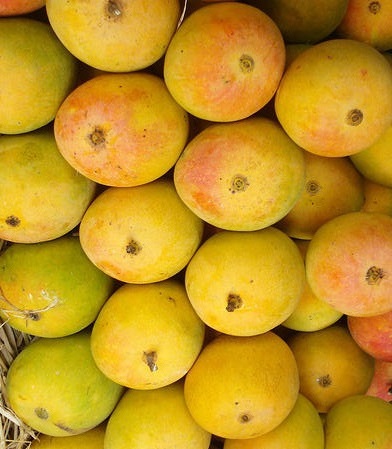
Description
Mango (Mangifera indica), A mango is a juicy drupe fruit varying in size, shape, color and sweetness. The fruits are mostly yellow, orange, red, or green. In addition, a Mango is low in calories yet high in nutrients particularly vitamin C, which aids immunity, iron absorption and growth and repair. A sliced mango (165 grams) provides: Calories(99 g),Protein(1.4 g), Carbs(24.7 g), Fat(0.6 g), Dietary fiber(2.6 g). A mango has more vitamins and minerals, according to the Reference Daily Intake in percentage: vitamin C 67, Copper 20, Folate 18, Vitamin B6 11.6, Vitamin A 10, Vitamin E 9.7, Vitamin B5 6.5, Vitamin K 6, Niacin 7, Potassium 6, Riboflavin 5, Manganese 4.5, Thiamine 4 and Magnesium 4. A mango has polyphenols which are plant compounds that function as antioxidants such as mangiferin, catechins, anthocyanins, quercetin, kaempferol, rhamnetin, benzoic acid to mention but a few. Mango polyphenols may fight oxidative stress, which is linked to stopped the growth or destroyed various cancer cells, including leukemia and cancer of the colon, lung, prostate, breast and bone cancers. Vitamin A is essential for a healthy immune system, as it helps fight infections and promotes healthy hair. The fruit also has digestive enzymes, water, dietary fiber and other compounds that aid different aspects of digestive health. Additionally Mangoes contains lutein, zeaxanthin and vitamin A which support eye health. Lutein and zeaxanthin may protect from the sun. The stoney fruit has vitamin C, which gives your skin its elasticity and prevents sagging and wrinkling. it offers magnesium and potassium, which help maintain a healthy pulse and your blood vessels relax, promoting lower blood pressure levels.
Nutrients
Calories(99 g)
Protein(1.4 g)
Carbs(24.7 g)
Fat(0.6 g)
Dietary fiber(2.6 g)